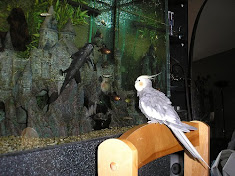 |
| Whatcha Doin'? by Tim Zim |
Instinct causes birds to hide their symptoms of illness. This is because in the wild any sign of weakness is an open invitation for the strong to attack. That is why having an avian veterinarian is a must. Taking your bird for regularly check ups can prevent small problems from become large ones. And having a vet as an immediate resource to contact about any changes in your pet's normal behavior can help you identify and successfully treat an illness, which ultimately can save your bird's life.
Provide a Properly Sized Cage
The space that you carve out for your bird to live will have a huge impact on every other aspect of its life. Providing a cage that is large enough for your bird to fully extend its wings without damage is a must. The bigger the cage the happier your pet will be. The ideal cage should also have several levels so that it can fly up or down to perches placed at different levels.
The cage should be placed away from drafts and at least one corner should be placed against a wall to give a sense of security. Avoid placing the cage in areas that get direct sunlight, as this can make it too hot. The cage should be cleaned completely at least once a month. Dried feces and dropping should be cleared daily to avoid having these airborne particles spread disease and infection.
The best material for cages is stainless steel. Initially it is more expensive, but this type of cage can last for the lifetime of your bird. It also eliminates the risk of harmful paints and metals that can prove fatal to your bird.
Meet Their Social Needs
Like people, different kinds of birds have different personalities. And the need for human interaction varies greatly depending on the type of bird you have. Be sure to research their requirements thoroughly before you adopt. Generally one bird will need more attention from its owner than a pair will. Knowing how much interaction is needed and making sure your bird gets the proper attention can greatly reduce health problems.
Failing to meet the social needs can lead to harmful behaviors such as feather plucking, and aggression. This type of stress often manifests itself as a decline in physical health. Providing food and water is surely important, but this piece of care is too.
Feed a Proper Diet
This varies greatly from one species to the next. The best way to decide what your bird needs is to check with your vet. Making sure the food you give is fresh, and is removed from the cage before spoilage can occur should be a routine procedure. Providing fresh water throughout the day will prevent your feathered friend from ingesting water that is contaminated.
Continuously Filter the Air
If your bird is breathing contaminated air it can severely impact their health. The bacteria and viruses that cause disease and infection often travel from one host to the next by attaching to airborne particulates. This is often the start of a downhill slide in their health.
Using a high-efficiency particle arresting (or HEPA) air purifier to keep the air fresh and clean is one of the best ways to help your bird live a long and happy life.
 |
| I Love Outside Time by Liz West |
Providing fresh clean air can greatly increase your bird's life span. See the air purifier that can do it now at http://purerair.com/bird_dust_air_purifier.html
Article From Pet Article World



0 comments:
Post a Comment